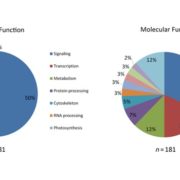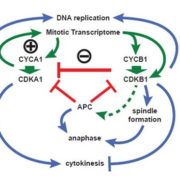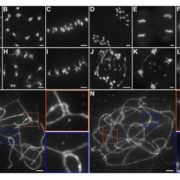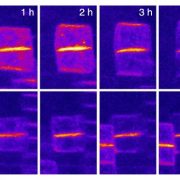Disruption of actin filaments in Zea mays by bisphenol A depends on their crosstalk with microtubules
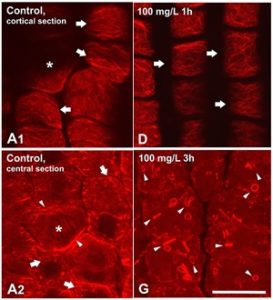 Bisphenol A (BPA) is known for its negative impact on mammalian cell lines and, recently, as an emerging environmental pollutant. BPA, readily taken up and metabolized by plants, results in many growth and developmental defects, from disrupted mitotic microtubule (MT) arrays to altered calcium fluctuations and actin disorganization during pollen tube growth. Stavropoulou et al. found that BPA treatment of Zea mays seedlings decreased germination and root growth, disrupted root MT organization, impaired preprophase band formation, and cells displayed defective cytokinesis. BPA-treated root meristematic protodermal cells exhibited abnormal actin filaments, which were in thick, ring/rod-like confirmations; similarly seen in rhizodermal cells within the elongation zone. These data show that BPA influences the cytoskeleton in dividing plant cells. It is important to understand the environmental impact of BPA as levels are increasing within the water and soil, and this may lead to adverse developmental consequences for many crop species (Summary by Alecia Biel) Chemosphere. 10.1016/J.chemosphere.2017.12.099.
Bisphenol A (BPA) is known for its negative impact on mammalian cell lines and, recently, as an emerging environmental pollutant. BPA, readily taken up and metabolized by plants, results in many growth and developmental defects, from disrupted mitotic microtubule (MT) arrays to altered calcium fluctuations and actin disorganization during pollen tube growth. Stavropoulou et al. found that BPA treatment of Zea mays seedlings decreased germination and root growth, disrupted root MT organization, impaired preprophase band formation, and cells displayed defective cytokinesis. BPA-treated root meristematic protodermal cells exhibited abnormal actin filaments, which were in thick, ring/rod-like confirmations; similarly seen in rhizodermal cells within the elongation zone. These data show that BPA influences the cytoskeleton in dividing plant cells. It is important to understand the environmental impact of BPA as levels are increasing within the water and soil, and this may lead to adverse developmental consequences for many crop species (Summary by Alecia Biel) Chemosphere. 10.1016/J.chemosphere.2017.12.099.





